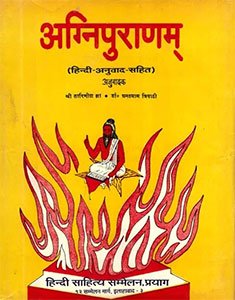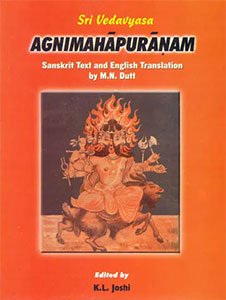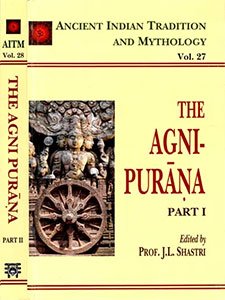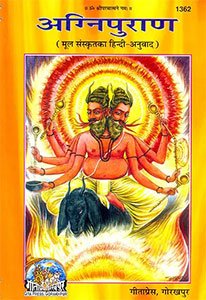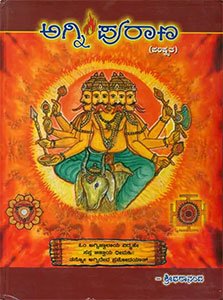Agni Purana [sanskrit]
97,288 words
This Sanskrit edition of the Agnipurana. It is one of the traditional eighteen Mahapuranas presented as an encyclopedia of ancient Indian history and knowledge. It contains either 382 or 383 chapters and over 10.000 verses (Sanskrit Shlokas).
Verse 61.26
।
टिप्पणी ।
१ मूर्तिभूतमिति ख ङ चिह्नितपुस्तकपाठः ।
२ धरणाद्वारुणीं विद्धि इति ख चिह्नितपुस्तकपाठः । धरणाद्वारुणीं देवीमिति ग चिह्नितपुस्तकपाठः । धारणीं धरणीं विद्धि इति ङ चिह्नितपुस्तकपाठः ।
३ पार्थिवं पृथिवीतलमिति ख चिह्नितपुस्तकपाठः । पार्थिवं पृथिवीजलमिति ग चिह्नितपुस्तकपाठः ।
४ रसमास्थाय दर्शनं रसमाह्वादि दर्शनमिति ख चिह्नितप्सुअतकपाठः । ।
निश्चलत्वञ्च गर्भोस्या अधिष्ठाता तु केशवः ।
एवमेव हरिः साक्षात्प्रासादत्वेन संस्थितः ॥ २६ ॥
|
ṭippaṇī |
1 mūrtibhūtamiti kha ṅa cihnitapustakapāṭhaḥ |
2 dharaṇādvāruṇīṃ viddhi iti kha cihnitapustakapāṭhaḥ | dharaṇādvāruṇīṃ devīmiti ga cihnitapustakapāṭhaḥ | dhāraṇīṃ dharaṇīṃ viddhi iti ṅa cihnitapustakapāṭhaḥ |
3 pārthivaṃ pṛthivītalamiti kha cihnitapustakapāṭhaḥ | pārthivaṃ pṛthivījalamiti ga cihnitapustakapāṭhaḥ |
4 rasamāsthāya darśanaṃ rasamāhvādi darśanamiti kha cihnitapsuatakapāṭhaḥ | |
niścalatvañca garbhosyā adhiṣṭhātā tu keśavaḥ |
evameva hariḥ sākṣātprāsādatvena saṃsthitaḥ || 26 ||
The Sanskrit text of Verse 61.26 is contained in the book The Agni Puranam (Anandashram Edition) by Shri Chimna Apate (श्री चिमणा आपटे). This book is available online or you could buy the latest edition:
Read online Buy now! The Sanskrit text by Shri Chimna Apate (श्री चिमणा आपटे) (1987)
Glossary of Sanskrit terms
Note: This extracts Sanskrit terms and links to English definitions from the glossary, based on an experimental segmentation of verse (61.26). Some terms could be superfluous while some might not be mentioned. Click on the word to show English definitions.
Tippani, Murti, Bhuta, Iti, Kha, Cihnita, Pustaka, Patha, Dharana, Varuni, Devi, Dharani, Parthiva, Prithivitala, Prithivi, Jala, Rasa, Asthaya, Darshana, Ahu, Ahva, Adi, Adin, Nishcalatva, Adhishthatri, Keshava, Evam, Eva, Hari, Sakshat, Saksha, Prasada, Tva, Samsthita,
Analysis of Sanskrit grammar
Note: this is an experimental feature and only shows the first possible analysis of the Sanskrit text (Verse 61.26). If the system was successful in segmenting the sentence, you will see of which words it is made up of, generally consisting of Nouns, Pronouns, Verbs, Participles and Indeclinables. Click on the link to show all possible derivations of the word.
- Line 1: “ṭippaṇī ”
- ṭippaṇī -
-
ṭippaṇī (noun, feminine)[compound], [nominative single]
- Line 2: “1 mūrtibhūtamiti kha ṅa cihnitapustakapāṭhaḥ ”
- Cannot analyse 1*mū
- mūrti -
-
mūrti (noun, feminine)[compound], [adverb]mūrti (noun, masculine)[compound], [adverb]mūrtī (noun, masculine)[adverb], [vocative single]mūrtī (noun, feminine)[compound], [adverb], [vocative single]mūrtī (noun, neuter)[compound], [adverb], [nominative single], [vocative single], [accusative single]
- bhūtam -
-
bhūta (noun, masculine)[adverb], [accusative single]bhūta (noun, neuter)[adverb], [nominative single], [accusative single]bhūtā (noun, feminine)[adverb]√bhū (verb class 1)[injunctive active second dual]
- iti -
-
iti (indeclinable particle)[indeclinable particle]iti (noun, feminine)[compound], [adverb]
- kha -
-
kha (noun, masculine)[compound], [vocative single]kha (noun, neuter)[compound], [vocative single]
- ṅa -
-
ṅa (noun, masculine)[compound], [vocative single]
- cihnita -
-
cihnita (noun, masculine)[compound], [vocative single]cihnita (noun, neuter)[compound], [vocative single]
- pustaka -
-
pustaka (noun, masculine)[compound], [vocative single]pustaka (noun, neuter)[compound], [vocative single]
- pāṭhaḥ -
-
pāṭha (noun, masculine)[nominative single]
- Line 3: “2 dharaṇādvāruṇīṃ viddhi iti kha cihnitapustakapāṭhaḥ | dharaṇādvāruṇīṃ devīmiti ga cihnitapustakapāṭhaḥ | dhāraṇīṃ dharaṇīṃ viddhi iti ṅa cihnitapustakapāṭhaḥ ”
- Cannot analyse 2*dh
- dharaṇād -
-
dharaṇa (noun, masculine)[adverb], [ablative single]dharaṇa (noun, neuter)[adverb], [ablative single]
- vāruṇīm -
-
vāruṇī (noun, feminine)[accusative single]
- viddhi -
-
viddhi (noun, feminine)[compound], [adverb]√vid (verb class 2)[imperative active second single]
- iti -
-
iti (indeclinable particle)[indeclinable particle]iti (noun, feminine)[compound], [adverb]
- kha -
-
kha (noun, masculine)[compound], [vocative single]kha (noun, neuter)[compound], [vocative single]
- cihnita -
-
cihnita (noun, masculine)[compound], [vocative single]cihnita (noun, neuter)[compound], [vocative single]
- pustaka -
-
pustaka (noun, masculine)[compound], [vocative single]pustaka (noun, neuter)[compound], [vocative single]
- pāṭhaḥ -
-
pāṭha (noun, masculine)[nominative single]
- dharaṇād -
-
dharaṇa (noun, masculine)[adverb], [ablative single]dharaṇa (noun, neuter)[adverb], [ablative single]
- vāruṇīm -
-
vāruṇī (noun, feminine)[accusative single]
- devīm -
-
devī (noun, feminine)[accusative single]
- iti -
-
iti (indeclinable particle)[indeclinable particle]iti (noun, feminine)[compound], [adverb]
- ga -
-
ga (noun, masculine)[compound], [vocative single]ga (noun, neuter)[compound], [vocative single]
- cihnita -
-
cihnita (noun, masculine)[compound], [vocative single]cihnita (noun, neuter)[compound], [vocative single]
- pustaka -
-
pustaka (noun, masculine)[compound], [vocative single]pustaka (noun, neuter)[compound], [vocative single]
- pāṭhaḥ -
-
pāṭha (noun, masculine)[nominative single]
- dhāraṇīm -
-
dhāraṇī (noun, feminine)[accusative single]
- dharaṇīm -
-
dharaṇī (noun, feminine)[accusative single]
- viddhi -
-
viddhi (noun, feminine)[compound], [adverb]√vid (verb class 2)[imperative active second single]
- iti -
-
iti (indeclinable particle)[indeclinable particle]iti (noun, feminine)[compound], [adverb]
- ṅa -
-
ṅa (noun, masculine)[compound], [vocative single]
- cihnita -
-
cihnita (noun, masculine)[compound], [vocative single]cihnita (noun, neuter)[compound], [vocative single]
- pustaka -
-
pustaka (noun, masculine)[compound], [vocative single]pustaka (noun, neuter)[compound], [vocative single]
- pāṭhaḥ -
-
pāṭha (noun, masculine)[nominative single]
- Line 4: “3 pārthivaṃ pṛthivītalamiti kha cihnitapustakapāṭhaḥ | pārthivaṃ pṛthivījalamiti ga cihnitapustakapāṭhaḥ ”
- Cannot analyse 3*pā
- pārthivam -
-
pārthiva (noun, masculine)[adverb], [accusative single]pārthiva (noun, neuter)[adverb], [nominative single], [accusative single]
- pṛthivītalam -
-
pṛthivītala (noun, neuter)[adverb], [nominative single], [accusative single]
- iti -
-
iti (indeclinable particle)[indeclinable particle]iti (noun, feminine)[compound], [adverb]
- kha -
-
kha (noun, masculine)[compound], [vocative single]kha (noun, neuter)[compound], [vocative single]
- cihnita -
-
cihnita (noun, masculine)[compound], [vocative single]cihnita (noun, neuter)[compound], [vocative single]
- pustaka -
-
pustaka (noun, masculine)[compound], [vocative single]pustaka (noun, neuter)[compound], [vocative single]
- pāṭhaḥ -
-
pāṭha (noun, masculine)[nominative single]
- pārthivam -
-
pārthiva (noun, masculine)[adverb], [accusative single]pārthiva (noun, neuter)[adverb], [nominative single], [accusative single]
- pṛthivī -
-
pṛthivī (noun, feminine)[compound], [nominative single]pṛthivi (noun, feminine)[nominative dual], [vocative dual], [accusative dual]
- jalam -
-
jala (noun, masculine)[adverb], [accusative single]jala (noun, neuter)[adverb], [nominative single], [accusative single]jalā (noun, feminine)[adverb]
- iti -
-
iti (indeclinable particle)[indeclinable particle]iti (noun, feminine)[compound], [adverb]
- ga -
-
ga (noun, masculine)[compound], [vocative single]ga (noun, neuter)[compound], [vocative single]
- cihnita -
-
cihnita (noun, masculine)[compound], [vocative single]cihnita (noun, neuter)[compound], [vocative single]
- pustaka -
-
pustaka (noun, masculine)[compound], [vocative single]pustaka (noun, neuter)[compound], [vocative single]
- pāṭhaḥ -
-
pāṭha (noun, masculine)[nominative single]
- Line 5: “4 rasamāsthāya darśanaṃ rasamāhvādi darśanamiti kha cihnitapsuatakapāṭhaḥ | ”
- Cannot analyse 4*ra
- rasam -
-
rasa (noun, masculine)[adverb], [accusative single]rasā (noun, feminine)[adverb]
- āsthāya -
-
āsthāya (indeclinable)[indeclinable]
- darśanam -
-
darśana (noun, masculine)[adverb], [accusative single]darśana (noun, neuter)[adverb], [nominative single], [accusative single]darśanā (noun, feminine)[adverb]
- rasam -
-
rasa (noun, masculine)[adverb], [accusative single]rasā (noun, feminine)[adverb]
- āhvā -
-
āhū (noun, feminine)[compound], [adverb], [vocative single], [instrumental single]āhva (noun, masculine)[compound], [vocative single]āhva (noun, neuter)[compound], [vocative single]āhvā (noun, feminine)[nominative single]
- ādi -
-
ādi (noun, masculine)[compound], [adverb]ādi (noun, neuter)[compound], [adverb], [nominative single], [vocative single], [accusative single]ādi (noun, feminine)[compound], [adverb]ādin (noun, masculine)[compound], [adverb]ādin (noun, neuter)[compound], [adverb], [nominative single], [vocative single], [accusative single]
- darśanam -
-
darśana (noun, masculine)[adverb], [accusative single]darśana (noun, neuter)[adverb], [nominative single], [accusative single]darśanā (noun, feminine)[adverb]
- iti -
-
iti (indeclinable particle)[indeclinable particle]iti (noun, feminine)[compound], [adverb]
- kha -
-
kha (noun, masculine)[compound], [vocative single]kha (noun, neuter)[compound], [vocative single]
- Cannot analyse cihnitapsuatakapāṭhaḥ
- Line 6: “niścalatvañca garbhosyā adhiṣṭhātā tu keśavaḥ ”
- niścalatvañ -
-
niścalatva (noun, masculine)[adverb], [accusative single]niścalatva (noun, neuter)[adverb], [nominative single], [accusative single]
- ca -
-
ca (indeclinable conjunction)[indeclinable conjunction]ca (noun, masculine)[compound], [vocative single]ca (noun, neuter)[compound], [vocative single]
- garbho -
-
- syā* -
-
si (noun, feminine)[ablative single], [genitive single]√as (verb class 2)[optative active second single]
- adhiṣṭhātā -
-
adhiṣṭhātṛ (noun, masculine)[nominative single]
- tu -
-
tu (indeclinable particle)[indeclinable particle]
- keśavaḥ -
-
keśava (noun, masculine)[nominative single]
- Line 7: “evameva hariḥ sākṣātprāsādatvena saṃsthitaḥ ”
- evam -
-
evam (indeclinable adverb)[indeclinable adverb]evam (indeclinable)[indeclinable]eva (noun, masculine)[adverb], [accusative single]eva (noun, neuter)[adverb], [nominative single], [accusative single]evā (noun, feminine)[adverb]
- eva -
-
eva (indeclinable particle)[indeclinable particle]eva (noun, masculine)[compound], [vocative single]eva (noun, neuter)[compound], [vocative single]
- hariḥ -
-
hari (noun, masculine)[nominative single]hari (noun, feminine)[nominative single]
- sākṣāt -
-
sākṣāt (indeclinable)[indeclinable]sākṣa (noun, masculine)[adverb], [ablative single]sākṣa (noun, neuter)[adverb], [ablative single]
- prāsāda -
-
prāsāda (noun, masculine)[compound], [vocative single]
- tvena -
-
tva (noun, masculine)[instrumental single]tva (noun, neuter)[instrumental single]
- saṃsthitaḥ -
-
saṃsthita (noun, masculine)[nominative single]
Other editions:
Also see the following editions of the Sanskrit text or (alternative) English translations of the Verse 61.26
Agni Purana with Hindi Translation
by Tarinish Jha and Dr. Ghanshayam Tripathi (तारिणीश् झा और डॉ. घनश्याम त्रिपाठी) (2007)
Publisher: Hindi Sahitya Sammelan, Allahabad; 1199 pages; Title: अग्निपुराणम् (संस्कृत एवं हिन्दी अनुवाद);
Buy now!
Agni Purana (Two Volumes)
by M. N. Dutt (2023)
Publisher: Parimal Publication Pvt. Ltd.; Editor: K. L. Joshi.; ISBN-10: 8171101690; ISBN-13: 9788171101696; 1070 pages.
Buy now!
Agni-Purana (Set of 4 Volumes)
by N. Gangadharan (2006)
Publisher: Motilal Banarsidass Publishers Pvt. Ltd.; ISBN: Part I 8120803590 (9788120803596); Part II 8120803604 (9788120803602); Part III 8120801741 (9788120801745); Part IV 812080306X (9788120803060); 1271 pages.
Buy now!
The Agni Purana (Hindi)
by (2013)
Publisher: Gita Press, Gorakhpur; Title: अग्निपुराण (केवल हिन्दी अनुवाद); ISBN-10: 8129302934; ISBN-13: 9788129302939; 848 pages.
Buy now!
Agni Purana (Kannada)
by Sreedharananda (2013)
Publisher: Pooja Pusthaka Bhandara, Bangalore; Title: ಅಗ್ನಿ ಪುರಾಣ; 560 pages.
Buy now!Preview of verse 61.26 in Kannada sript:
।
ಟಿಪ್ಪಣೀ ।
೧ ಮೂರ್ತಿಭೂತಮಿತಿ ಖ ಙ ಚಿಹ್ನಿತಪುಸ್ತಕಪಾಠಃ ।
೨ ಧರಣಾದ್ವಾರುಣೀಂ ವಿದ್ಧಿ ಇತಿ ಖ ಚಿಹ್ನಿತಪುಸ್ತಕಪಾಠಃ । ಧರಣಾದ್ವಾರುಣೀಂ ದೇವೀಮಿತಿ ಗ ಚಿಹ್ನಿತಪುಸ್ತಕಪಾಠಃ । ಧಾರಣೀಂ ಧರಣೀಂ ವಿದ್ಧಿ ಇತಿ ಙ ಚಿಹ್ನಿತಪುಸ್ತಕಪಾಠಃ ।
೩ ಪಾರ್ಥಿವಂ ಪೃಥಿವೀತಲಮಿತಿ ಖ ಚಿಹ್ನಿತಪುಸ್ತಕಪಾಠಃ । ಪಾರ್ಥಿವಂ ಪೃಥಿವೀಜಲಮಿತಿ ಗ ಚಿಹ್ನಿತಪುಸ್ತಕಪಾಠಃ ।
೪ ರಸಮಾಸ್ಥಾಯ ದರ್ಶನಂ ರಸಮಾಹ್ವಾದಿ ದರ್ಶನಮಿತಿ ಖ ಚಿಹ್ನಿತಪ್ಸುಅತಕಪಾಠಃ । ।
ನಿಶ್ಚಲತ್ವಞ್ಚ ಗರ್ಭೋಸ್ಯಾ ಅಧಿಷ್ಠಾತಾ ತು ಕೇಶವಃ ।
ಏವಮೇವ ಹರಿಃ ಸಾಕ್ಷಾತ್ಪ್ರಾಸಾದತ್ವೇನ ಸಂಸ್ಥಿತಃ ॥ ೨೬ ॥
![Agni Purana [sanskrit] - book cover](/uploads/a/Agni-Purana-Sanskrit.jpg)
